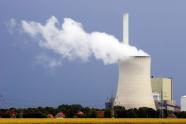Federal Court Throws Cold Water on Nuclear Waste Ruling
NRC must prove no significant environmental harm

The nuclear energy industry here has just been
dealt a blow -- by a U.S. federal appeals court. One
just ruled that nuclear regulators did not fully
assess the risks associated with allowing utilities
to store their spent fuel onsite for decades longer
than originally intended.
The
U.S. Court of Appeals from the District of Columbia
wrote that by stretching the time period from 30
years to as many 60 years, the U.S. Nuclear
Regulatory Commission (NRC) failed to properly
examine the environmental consequences of its
actions. As a result of the NRC’s earlier decision,
some states sued and argued that any leaks from the
spent fuel storage pools or dry cask storage could
harm groundwater supplies and potential land use.
Four Northeastern states that include Connecticut
and New York won this round, along with the
environmentalists supporting their cause -- a legal
case that took direct aim at the NRC’s 2010 decision
to extend the time frame to store nuclear waste. The
parties that brought the suit now maintain that the
court ruling, effectively, prevents the NRC from
licensing or re-licensing any nuclear plants until
commissioners conduct a full review of the potential
environmental risks from extending onsite storage
rights.
“This is a critical decision for Connecticut and
other states with nuclear power plants,” says
Connecticut Attorney General Jepsen. “It means
the federal regulators must make a full and
comprehensive analysis of the potential
environmental impact of before allowing additional
decades of storage of high-level nuclear waste at
reactor sites.”
Both the Indian Point reactor in New York and the
Vermont Yankee reactor have had small leaks
containing nuclear material that seeped into the
groundwater. Altogether, 65,000 tons of spent fuel
are stored at 75 operating reactor sites around the
country. More than 2,000 tons are being
produced each year.
The nuclear industry says that it is studying the
issue but acknowledges that the decision is a
setback. It believes that the NRC did present a
compelling case in 2010. But it says that it is now
imperative that the commission fulfill its legal
obligations under the Environmental Protection Act
so that nuclear operators are not left in regulatory
limbo. Long run, though, the industry still
maintains that a permanent storage facility is
necessary.
New Strategy
The ruling did say that the NRC does not have to
provide such a detailed analysis for each and every
onsite storage site -- only a general environmental
impact statement or a finding of no significant
environmental harm. Still, opposition groups are
saying that they will push hard to require
site-specific evaluations, which could add years to
any licensing or re-licensing process.
“We are disappointed by the court’s decision,” says
Ellen Ginsberg, general counsel for the
Nuclear Energy Institute. “Nonetheless, we urge
the commission to act expeditiously to undertake the
additional environmental analysis identified by the
court in the remand.”
The ruling could spell trouble for an industry that
has been coping with Japan’s nuclear crisis. And
when coupled with the Obama administration’s
decision to cut off funding for a permanent storage
site at Yucca Mountain in Nevada a few years ago, it
would appear that nuclear industry has its hands
tied.
But not so fast. Yucca Mountain may get a second
life. Advocates of the proposed permanent storage
site are saying that U.S. officials have a legal
obligation to create the burial site whereas the
opponents are saying that there are too many
pitfalls associated with the location. The U.S.
Court of Appeals for the District of Columbia could
decide in a few months whether to force the NRC to
re-open a licensing case.
Recognizing that nuclear energy here makes up 20
percent of the generation portfolio and that such
plants won’t just evaporate, the court ruling could
conceivably work to expedite a pro-industry finding.
And it is probable that the NRC’s revisions to its
earlier onsite storage analysis will still result in
the same conclusions -- that extending the time
frame is environmentally feasible, and safe.
“The need for a new strategy is urgent, not just to
address these damages and costs but because this
generation has a fundamental, ethical obligation to
avoid burdening future generations with the entire
task of finding a safe, permanent solution for
managing hazardous nuclear materials they had no
part in creating,” says the president’s
Blue Ribbon Commission on America’s Nuclear Future.
Onsite storage of nuclear waste was never meant to
be a long-term solution. But nuclear operators have
only acquiesced to extending such rights because
they are unable to find a permanent resting spot.
The court ruling may hamstring the nuclear industry
but it could also focus legislative attention on
what it needs to continue providing reliable energy
to the American people.
EnergyBiz Insider is named a 2012 Finalist for
Original Web Commentary presented by the American
Society of Business Press Editors. The column is
also the Winner of the 2011 Online Column category
awarded by Media Industry News, MIN. Ken Silverstein
has been named one of the Top Economics Journalists
by Wall Street Economists.
Twitter: @Ken_Silverstein
energybizinsider@energycentral.com
Copyright © 1996-2012 by CyberTech, Inc. All rights reserved.
To subscribe or visit go to: http://www.energycentral.com
To subscribe or visit go to: http://www.energybiz.com